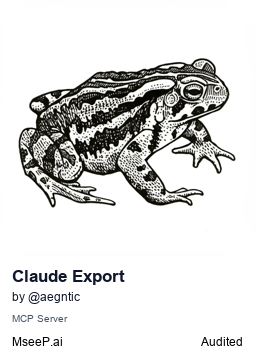About
Aegntic MCP Collection bundles a variety of MCP servers that empower AI agents with documentation, authentication, data analysis, image generation, workflow automation, and knowledge graph capabilities. It offers a single configuration for Claude Desktop, Claude Code, and local development.
Capabilities

Aegntic MCP Collection is a unified ecosystem of Model Context Protocol servers designed to extend the capabilities of AI assistants such as Claude. The core problem it addresses is the fragmented nature of tooling that developers face when building AI‑powered applications: disparate libraries, inconsistent configuration paths, and a lack of cohesive integration between documentation, authentication, data analysis, and image generation. By packaging these services into a single repository with a standardized configuration layout, Aegntic MCP removes the friction of onboarding new tools and ensures that every server behaves identically across Claude Desktop, Claude Code, and any custom MCP client.
At its heart, the collection offers a rich set of servers that cover everything from automated documentation (dailydoco‑pro) to advanced prompt orchestration (just‑prompt). Each server exposes a well‑defined MCP interface, allowing the assistant to request resources, run tools, or query prompts with minimal overhead. For example, the Aegntic Knowledge Engine delivers a zero‑cost knowledge graph that can be queried in real time, while the n8n MCP unlocks thousands of workflow nodes for automating complex business processes. The inclusion of both local/UV and NPM‑based servers gives developers flexibility in deployment—whether they prefer to run a lightweight local instance or leverage a managed NPM package.
Developers benefit from several standout features. First, the unified configuration directory () centralizes all server definitions, eliminating duplicate entries across environments. Second, the collection ships with pre‑configured servers for common cloud services (Firebase Studio MCP) and container orchestration (Docker MCP), enabling rapid integration of external infrastructure into AI workflows. Third, the Quick Data and Graphiti‑MCP servers provide low‑latency data analysis and memory graph capabilities, allowing assistants to surface insights or maintain contextual knowledge without external dependencies.
Real‑world scenarios for Aegntic MCP include building a knowledge‑base chatbot that pulls from live web content, creating an AI‑driven marketing automation platform that stitches together n8n workflows and image generation via ComfyUI, or exporting entire Claude Desktop projects into Markdown for version control. In each case, the MCP servers act as first‑class citizens in the assistant’s toolset, enabling developers to compose sophisticated, end‑to‑end solutions without reinventing the wheel.
Related Servers
MarkItDown MCP Server
Convert documents to Markdown for LLMs quickly and accurately
Context7 MCP
Real‑time, version‑specific code docs for LLMs
Playwright MCP
Browser automation via structured accessibility trees
BlenderMCP
Claude AI meets Blender for instant 3D creation
Pydantic AI
Build GenAI agents with Pydantic validation and observability
Chrome DevTools MCP
AI-powered Chrome automation and debugging
Weekly Views
Server Health
Information
Tags
Explore More Servers
Mcp Runner
Efficiently run and manage MCP servers with reuse and cleanup
DependencyMCP Server
Generate dependency graphs and architectural insights across languages
ClickUp Operator MCP Server
Simple note storage and summarization for ClickUp integration
Liana MCP Server
Natural language scRNA‑Seq analysis via Liana
Google Calendar AutoAuth MCP Server
Seamless Google Calendar integration with auto-auth for Claude Desktop
Apappascs MCP Servers Hub
Central catalog of open-source and proprietary MCP servers